Ambassador of Latvia Ilgvars Klava: Russians started war, they have to pay for consequences of this war
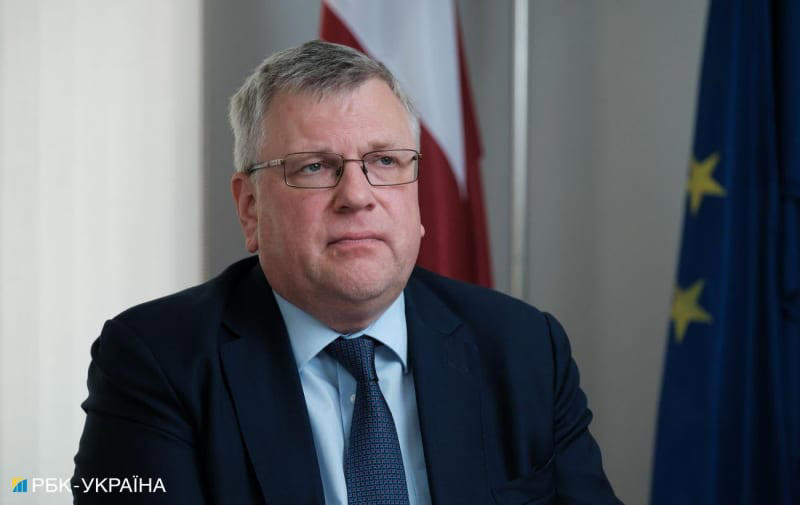
Ambassador of Latvia to Ukraine Ilgvars Klava (all photos: Vitalii Nosach / RBC-Ukraine)
Latvia's Ambassador to Ukraine, Ilgvars Klava, discussed Latvia's preparations for a potential Russian invasion, the current situation in the Russia-Ukraine war, military aid to Ukraine from Latvia, talks about a "peaceful settlement," Western weapon strikes on Russian territory, and Ukraine's integration into the EU and NATO in an interview with RBC-Ukraine.
Latvia is often cited as a potential primary target in scenarios of possible Russian aggression against NATO member countries—something echoed by RBC-Ukraine's sources within Ukrainian government circles. According to Ilgvars Klava, the Extraordinary and Plenipotentiary Ambassador of Latvia to Ukraine, Riga does not currently consider the risk of a Russian invasion to be very high. Nonetheless, Latvia is actively bolstering its defense capabilities, while also relying on support from NATO ally countries.
Meanwhile, Latvia continues to provide various forms of aid to Ukraine, including not just military assistance. Latvians are also actively involved in helping the civilian population by rebuilding homes destroyed by Russian aggressors in the Chernihiv region.
Latvia has also become one of the countries to sign a bilateral security agreement with Ukraine, committing to allocate at least 0.25% of its GDP to support Ukraine.
- Latvian Parliament may allow foreigners to serve in your armed forces. Riga City Council has asked the residents to check the basements of their houses to be able to use them as shelters. Your Ministry of Defense has recently issued a booklet named 'What to do in case of war'. It all seems that your country is in full swing preparing for a possible Russian aggression, either hybrid or direct. So do you think that the risk of such aggression is big? And what time frame can we talk about?
- We don't think that the risk is very high at the moment. It's basically the opinion of our Defense Forces, Ministry of Defense. In today's circumstances, Latvia is militarily secured as well as never before. I mean we are a member of the NATO alliance, we are working together with our partners, we are investing significant amounts of resources, and money in our defense forces. The point is that this is a process. You cannot say that we are 100% ready.
No country in the world is ready. There are always technological improvements, changes on the modern battlefield, changes in military tactics, equipment, technologies, and so on and so on.
But at the same time being a member of the most powerful military alliance, we have to ensure that we do the utmost what depends on us, in order to minimize any threat of military conflict that involves our country.
And that is exactly what we are doing. And part of that preparation is informing society about what needs to be done in order to avoid military conflict. If such a thing happens, then we are to be prepared as individuals, as members of society to act accordingly to the situation that is created, be it military confrontation or some sort of hybrid threat.
You mentioned shelters or booklets about how to act in case of war – these are elements of the preparation of the Latvian society to be ready physically, in terms of defense means, in terms of weapons and action and knowledge, but also psychologically, if such a situation is created.
- According to many assessments, Russia will never stop in Ukraine and will continue its aggressive actions, whether we talk about Baltic states or Moldova or Kazakhstan or who knows. So does everyone in Latvia agree with such an opinion that Russia will not stop here and what do your colleagues from the countries that are located further to the West from Russia think about this, do they understand this threat?
Not all but the majority of our society understands and is concerned that the aggressive policy carried out by Russia is a threat to our national security, obviously. And not only to our national security but basically to the whole democratic community of European countries.
Returning to your previous question, I would say that there is no direct military threat, and there is no high probability that there will be an immediate Russian military attack against Latvia or Baltic countries or NATO altogether. But the situation is changing all the time. So we cannot guarantee that this aggressive policy by Russia doesn't lead to a military confrontation with either Baltic countries in the region, with other NATO countries, or with countries that are not members of the Alliance.
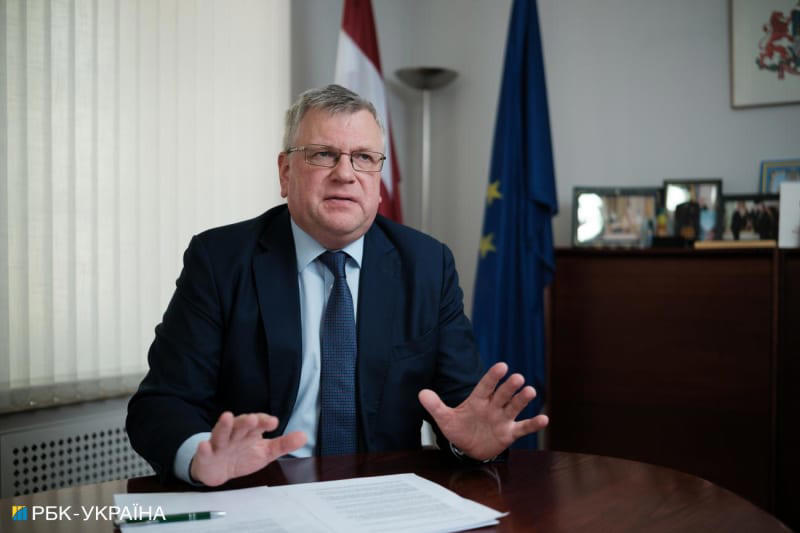
My personal opinion is that the NATO territory will not be the most threatened territory. Not the first where Russia could go and test, so to say, resilience.
But anyway, if we approach our security in a responsible manner, and when we evaluate what Russia is doing now, Russia is attacking Ukraine, has provoked the war, has started the war, and the full-scale war is going on already more than two years, making calculations, we can see that there is a serious risk to national security.
it's not immediate, but there is a serious risk. You can see it. There are signs. You can clearly see that there is an aggressive policy carried out by Russia. And it can go to other countries, other directions. We have to do everything possible in order to minimize the possibility of even such a thought appearing somewhere on the table in Moscow, that they can succeed or they can seriously consider attacking NATO territory. I think the higher risk is for countries that are outside of the NATO military alliance.
- In the worst case scenario, if something happens against your country, is Latvia, Latvian society, 100% sure that your allies in NATO, like Germany, France, the UK, and the USA, will do everything they can to protect your country?
- We believe that we entered NATO based on the thought and conviction that NATO is an effective military alliance. In our opinion, it stays like that.
It requires lots of improvements because NATO countries, especially Western European countries, have been living in a sort of, I wouldn't say illusion, but sort of lullaby song sounds that everything is nice, there is no military threat on the European continent, that military conflicts of a large scale are somewhere outside of Europe, far away, I don't know, be it Africa, Afghanistan, Iraq, Middle East, somewhere else, but not in Europe.
- And it's all from the past.
- And it's all from the past. Full-scale war in Ukraine has led to one thing. Europe is changing, tectonic changes are happening now in Europe, especially in European NATO countries. That means an increase in the defense budget, which means an increase in defense forces, personnel, equipment, military production, and so on.
I don't think that Moscow likes it very much, but they created this situation, that Europe, like a big ship, is turning around and setting on a new course.
This is happening in countries like Germany, for instance, that said 'no' to exports of military equipment to the conflict zones before 2022. Now it has changed dramatically, Ukraine receives German weapon systems. And this is just a sign that Europe is also turning around and adjusting to the new security situation which has been provoked by Russian military aggression against Ukraine.
So, yes, we do believe that NATO is an effective military alliance. It doesn't take away our first responsibility of defending our own territory. Obviously, we will do that and the whole defense policy is aimed at being able to defend our territory effectively if such an attack comes. But of course, we also count on the NATO military alliance coming into assistance.
- How actively is Russia trying to carry out different subversive activities in Latvia, including those that rely upon a large Russian ethnic minority that lives in your country?
- It's a constant narrative, of course, about the ethnic Russian minority in Russian politics. It has been for decades. I wouldn't say that lately it has been pushed harder or made sharper. We don't see anything extraordinary there.
If I have to compare with Donetsk before the war, Donbas altogether, and Crimea where there were lots of Russian settlers during the Soviet period, I mean, an ethnic composition was specifically created, and retired military personnel and so on played a role in occupying these territories. But in our case, the proportion of the Russian ethnic population has gone down dramatically since 1990 and now it's around, maybe 25%.
- It's still pretty much.
- Still pretty much, but still going down. The trend is downwards. But not everybody who is Russian necessarily supports Russian aggression. Many ethnic Russians in Latvia don't feel comfortable talking about Russia's attack against Ukraine, because, in my opinion, they don't want to take sides. They somehow feel emotionally attached to their relatives in Russia and it makes it difficult to recognize that Russia is wrong, that it's a wrong policy. They don't want to take any sides, that's as far as I have noticed.
They are not very eager to speculate on these things. Emotionally one can understand the reasoning behind that.
But then of course there is no denying that Russia is attempting to use individuals based on this emotional attachment to Russia and their relatives. Russians are eager to use all the channels to achieve the goals they have in mind.
One goal is of course, NATO forces' presence in Latvia, in all Baltic states, and also in Poland, Romania, and all the Eastern flank of NATO. Of course, there is Russian interest there: spying, what is happening, what kind of NATO forces are coming in, gathering information. Among other things, they are also using the local population as assistance, as spies, I mean, to gather this information. They are being caught they have been tried and sentenced.
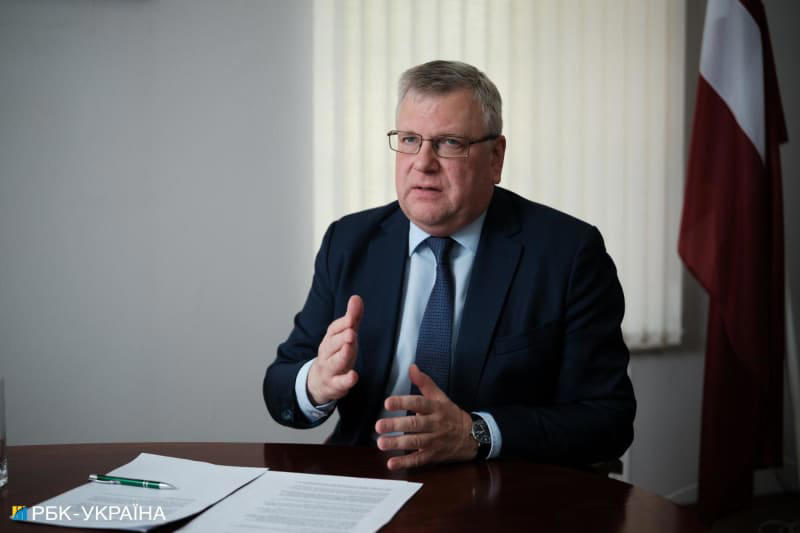
In addition, they try to do small annoying things. In Latvia, like scratching the 'Z' sign on a wall or something like that. It doesn't mean much, but it's just to create a kind of psychological discomfort, if at all. We have had occasions when some historical monuments in Latvia were damaged by paint. It is not, so to say, life-threatening, but it's annoying. But people are being caught, and people also are sentenced.
The police have caught a person recently who threw a Molotov cocktail into the window of the Occupation Museum of Latvia. He was recruited through the Telegram channels, by a person who was in prison. These individual cases, if they appear, are sorted out.
- Let's move on to Ukraine. How do you assess the current situation in general, from a bird-fight view, and do you see any chances for Ukraine to seize the initiative in the foreseeable future?
- There are several elements. With the macro-financial assistance of the European Union, and after the decision of the US Congress, with the delivery of assistance I think there are very high chances for Ukraine to go through this year. After the US vote, I would dare to say that, and that's my personal opinion, the Russian chances of any military offensive in Ukraine are basically doomed. There is a good reason to assume that they will fail in any attempt to do a kind of serious large-scale military operation against Ukraine, thanks to the assistance with weapons, with ammunition coming from the USA first of all, but also from other NATO countries.
But I want to mention two additional things. First of all, of course, it's a question about the manpower reserves on the Ukrainian side. This is very important. We are so glad to see that finally the law on mobilization has been passed through the parliament. It's very vital, it's a very essential thing, because the army needs reserves. Of course army also needs weapons and ammunition. Now the weapons and ammunition are secured, but you need to have trained reserves. First of all to hold off the possible Russian attack, like now in the Kharkiv region, but also in other possible directions.
We hope that this system will work effectively after the law has been adopted and there will be reserves in due time. It takes several months to train soldiers, to equip them, to form new brigades, and to make rotation possible on the front line.
Another thing is what the next year looks like. And that's not up to me to say, how. I mean, will there be any Ukrainian advance, any offensive, counter-offensive, how successfully they will be able to retake the territories?
We sincerely wish that the Ukrainian territorial integrity is fully restored to the borders of 1991. It's just. It must be done. It's absolutely in accordance with international law. The question is how to do that, but that is a question of military leadership and political leadership of Ukraine. We will support your decisions, and your steps in doing that, as much as we can, as much as we have done before in helping Ukraine. And I would say the rest of the NATO alliance will do the same.
- Latvia has helped us a lot since Day 1. But can you just make a general overview of what has been done, what is being done now, and what will be done in the future? And can you name the key points of the recent security agreement between Ukraine and Latvia?
- These security commitments are not in the form of a legal treaty, but it's an agreement. It's a memorandum of understanding of both sides, what we will do in the course of next years.
It's mostly related to cooperation in the defense industry field. We have many opportunities to act together to produce things together or to produce things by Latvia for Ukraine, with the support of international partners. And this is a very important, thing because both sides agree that we will closely coordinate to satisfy the needs of Ukrainian defense.
That is the one thing. But it also includes other things like military training, assistance in preparations for NATO, for European Union membership. It also includes reconstruction effort, what we are doing in Chernihiv oblast. So it covers a broad range of issues for the long-term support of Ukraine. I am very glad to see it happening and there is a very high degree of support for that in Latvian society.
The one thing is what the Latvian state can do. Let's say making a budget line for the reconstruction of Ukraine in our state budget and also giving some military equipment to Ukraine. But a large amount of needed things are delivered thanks to the support of society and non-governmental organizations. And we have an online platform that collects donations for Ukraine.
Then we have entrepreneurs, and business circles who support Ukraine and they have NGOs and they deliver a wide range of items starting from the cars, medication, other things. They are also involved in the reconstruction of the Chernihiv region, doing necessary things. Latvia builds houses there for the people there, whose housing was destroyed in a fighting in 2022.
That's a combination of state and society. As a state we would get some millions here, some millions there, but not hundreds and hundreds of millions, which are coming from Latvian businesses, from Latvian society, from individuals.
- As for the military component, what are the key positions that Latvia can provide Ukraine with?
- For instance, we have some technological solutions for manufacturing drones. We have items that we can deliver in the field of demining, which is very crucial, especially for the agro-sector. Last year we trained about 3,000 Ukrainian soldiers in Latvia and that's what we continue to do. Latvia, surprisingly, being a small country, is able to produce quite interesting things. I was, for instance, positively surprised that we are able to produce demining robots in Latvia. It's not probably the top thing which costs around a million dollars apiece but still, it works, it does its job.
We also have a common production of armored personnel carriers in Latvia with Finland. I don't know whether it will go in the direction of Ukraine, first of all, it will satisfy the needs of Latvian armed forces, but the future will tell, we will see. So, it's quite impressive for a country the size of Latvia, I would say.
- Different narratives continue circulating and become more relevant in Western media about 'the need to get peace', 'negotiations', 'plan B-C-D', etc. Do you think that all these narratives may eventually turn into a non-public, but political pressure on our leadership by Western leaders to agree to start negotiations, to agree to certain concessions to Russia? I'm not talking about your country, Latvia is not there. But you obviously communicate a lot with your colleagues. You know what they think.
- First of all, I can speak about Latvia. We will support your decision. It's your decision how this war goes on, where it ends, and under what conditions, it's the Ukrainian decision. We will support your decision, whatever decision you will make. We will definitely stand with you as long as it is your decision. So, obviously, in my understanding, any agreement will involve the issue of territories, of course.
And then that's the decision of Ukrainian leadership, in which direction Ukraine goes. We will support you, but it's your decision. That's what I can say on my part. And that's fully the position of Latvia, that we will support your decisions.
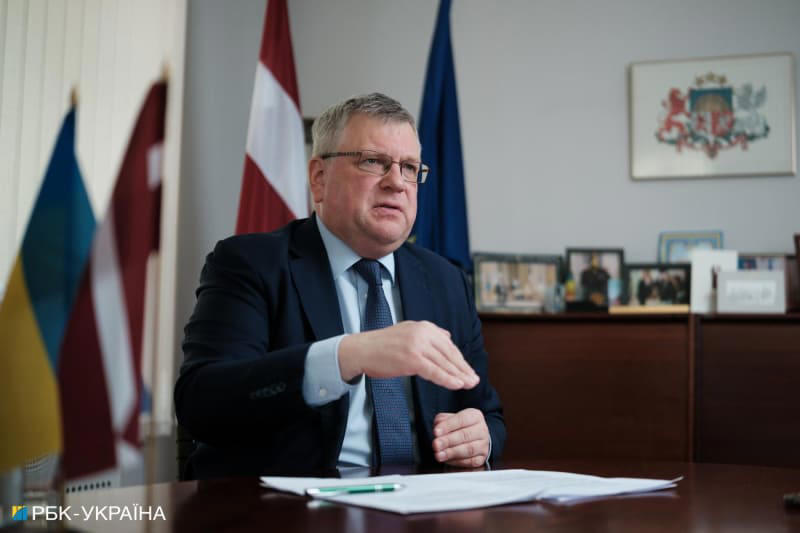
As for the possibilities, of course, politics doesn't exclude anything. I mean, there are plenty of options, obviously, but this is your decision. And we fully respect and stand by you on the point of restoring Ukraine's territorial integrity. This is absolutely understandable. It's just according to international law. How do you maneuver, how does your government, how does your president maneuver through these points, and what kind of conditions may be set in order to achieve a ceasefire, or peace agreement, that's up to Ukrainian leadership.
What we would not like to see – is a decision pressed upon Ukraine, which Ukraine doesn't agree with.
Russians also like to talk about peace but they like to talk about peace on their conditions. And that's what it is all about. Ukraine cannot be pressed into an unjust peace agreement which Ukraine doesn't agree with. If Ukraine doesn't agree but is under an ultimatum, pressed into a corner, that means, first of all, that it will not be a stable solution and that will be just a pause till the next war.
Basically, we talk about the principle. But theoretically, you cannot discount anything. There are plenty of possibilities for how war situations can be handled but it's your decision.
- President Zelenskyy said that Western partners don't want Russia to lose the war because there will be unpredictable consequences: they would like Ukraine to win – but not in a way that Russia will lose. But it doesn't work like that. What are your thoughts on that?
- I recognize the concerns, first of all, concerns about the strategic stability in terms of nuclear weapons. I think that's the first thing that comes to mind when we talk about politics in Washington and other countries as well.
The question is to what degree the degradation of Russia happens when Russians lose the war. And what happens to the Russian nuclear arsenal? That's the biggest headache I think from the beginning of the 90s. Initially, it was a headache of a breakdown of the Soviet Union. What happens then?.. Nothing happened. But there were lots of arrangements, including the notorious Budapest memorandum. The same issues are haunting strategic decision-makers today.
I mean if there are several Russias armed with nuclear weapons, that might seem to be a nightmare for many people around the world: what kind of agreements they are bound to, or are there any agreements they would follow about nuclear weapons, or will they just start firing them at free will at someone.
So that's one thing. But of course, there is geopolitics. One cannot deny it. People are looking at it. And you know it very well. The whole media space of Ukraine is filled with that: how it works, who gains what, who loses what, and what is the new situation. We are in the process of course. The basic thing is Ukraine cannot be blamed for anything. Ukraine didn't start this war. The Russians started, and Putin started this war. So the whole blame of whatever happens, I mean, in whatever condition Russia loses the war and what happens afterward – it's Putin to be blamed for, not Ukraine. This is a clear point of departure. The Russians started this war so they have to pay the price for this and for the consequences of this war.
I mean, I understand what your president is saying. His message is basically that Ukraine should not be limited by any side's considerations. I mean limiting Ukrainian options to strike Russian aggressors.
- What is Latvia's stance on that? Should all the Western partners allow us to strike wherever it is militarily needed?
- We find that these are legitimate targets, our minister has said that clearly. There are national interests of the U.S. and other countries that deliver major weapons systems, they have their own national considerations. If it was to us, we understand fully. I mean, legitimate military targets are legitimate military targets.
We have not seen Ukraine deliberately targeting civilian housing, apartments, or something like that in Russia, as Russians do deliberately in cities in Kharkiv, Odesa, and everywhere, all over Ukraine. So then to say to Ukraine: no, no, you don't do that, this is bad, you don't attack this, or you don't attack that… A military target is a military target. If the country of Russia is at war with the country of Ukraine, so if it's a legitimate military target, it can be hit.
- In your opinion, is time generally playing in favor of Ukraine or Russia?
- I genuinely believe that time is playing in favor of Ukraine, but there are things that Ukraine must do. This is a war of resources now. So you have to have a high degree of organization internally, politically, militarily, a high degree of efficiency, putting your military system in order, mobilizing reserves, equipping, training them. In the field of economy, it is very important that you have an attraction of foreign investors, have foreign businesses coming to Ukraine, regardless of the wartime situation.
In order to achieve that, your reforms, which you have to carry out anyway while moving towards the European Union, play a tremendous role. And I'm speaking about the justice system, about the courts, about fighting corruption, because corruption is like a cancer. It eats away the chances for speedy, effective development of your country. I mean if there is a high degree of corruption, if there are bad experiences and bad messages for businesses, and foreign investors coming into the country, that diminishes your chances for healthy, powerful development of the Ukrainian economy, which in turn is needed for your war effort. If there is some sort of interference in some cases from outside the court system, I mean if there is some, influence of either corrupt officials or simply corruption of the parts of the segment of the justice system, then it's bad. I mean, the more bad messages around, the worse it is for Ukraine.
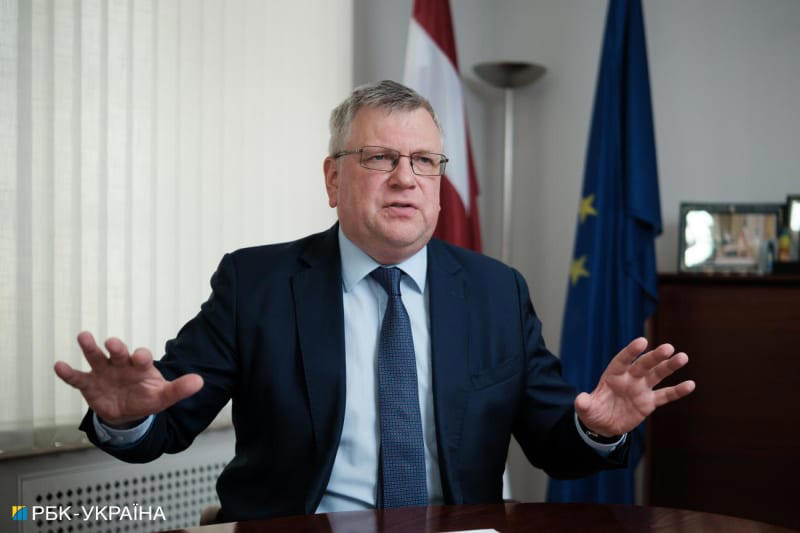
Totalitarian systems like Russia can exist for the time being. But usually, they fall because the leaders of totalitarian systems are the same mortals as everyone else. And that's the problem. I mean, every transfer of power is a big tragedy and fuss in Russia. We have seen the death of Stalin, we have seen the death of Brezhnev in Soviet times. After these moments in history, there have been breaking points and points of change, and something was falling apart systemically. After Brezhnev's succession, half-dead zombies, half-dead old communist functionaries, and then we got to Gorbachev and the whole system fell apart.
So it's a tricky point. I mean a totalitarian system, when it falls, it falls in pieces. What a democratic system usually doesn't do. I mean a normal democratic system. We of course experienced falling into pieces in Afghanistan, but that was not a democratic system like Switzerland. But it was specific and it's not an example. So I sincerely believe if Ukraine does continue reforms, which are essential, the chances are very good. And then of course the perspective of the EU becomes closer and closer.
- President Macron's initiative about the possible sending of troops to Ukrainian soil – what is Latvia's stance on that? Is it possible to implement?
- We should not write it off. Under certain circumstances, I think yes. I would not go that far, but we should not exclude that under certain circumstances this can materialize. If it materializes, it will be a collective decision. And then we will participate. But we cannot say at the moment what it will be, but as an option, it should not be written off.
And we can commend, I think, President Macron for moving forward with this idea, for announcing this idea. And let's see what happens. It's a right idea to say that under certain circumstances there will be foreign troops in Ukraine.
- Why hasn't the world ever managed to drive Russia into complete international isolation? And is it possible in principle, practically?
- It's difficult. We have a democratic world led by the United States and major European powers, but we have other countries of less democratic stance, or more authoritarian, or more state capitalist countries with different national interests, be it China, be it India, with a completely different history of relationship towards the Soviet Union initially and then Russia afterward.
So, it's a gradual process, but at least what Europe is doing, what the USA is doing, every step in the direction of sanctions diminishes the income of the Russian state, the income of money. From trade, from industry, from everything. No investments, no refinancing in international financial markets. Or more limited refinancing, banking system limitations. That all diminishes the economic potential of Russia and the Russian ability to build modern weapons or to build more weapons. And that is positive, I think.
- Ukraine's integration into the European Union and NATO. What to expect this year and what are your expectations, in particular from the Washington summit?
- NATO is working a lot, I cannot disclose any details, because this is a discussion in progress. But NATO is working very hard to better organize the military support of Ukraine. And that includes everything, military technologies, military assistance, training, and all the related things. As NATO Secretary General has said, to put Ukraine on the NATO track. He also mentioned that there is a plan for a greater NATO role in coordinating security assistance and training for Ukraine, and then a multi-year financial commitment to sustain the support of Ukraine. We hope that as soon as the political situation allows and 32 countries can agree that Ukraine will become a member of the NATO alliance, we will definitely support it.
As for the European Union – definitely the negotiation framework, the start of negotiations. We are working towards that goal. I cannot predict it. But that's our point of departure in our policy. We think definitely that we should move ahead, Ukraine has to move ahead, European Union has to move ahead. There is plenty of work to be done. It will take several years to accomplish that. But the crucial decision has been made. So we have to start to implement it.
